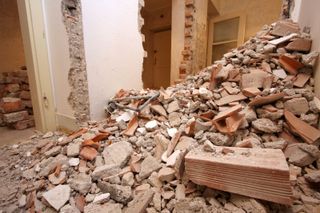This council is making up to £1m a year charging householders for DIY waste
Councils that charge for DIY waste disposal are costing Britons millions of pounds a year, with councils saying a ban on the charges will mean they increase council taxes to recoup the losses

Some councils are making up to £1 million a year charging residents who dispose of their DIY waste, it has been revealed.
This comes as the government announced it will ban councils being able to charge for disposal of DIY waste at recycling centres in news that will be welcome to those who arebuilding a houseor undertaking DIY projects.
However, councils have issued a warning that a ban on fees for disposing of DIY waste in England will result in increased costs for all households due to increased council taxes.
Councils making a fortune off DIY charges
DIY waste disposal is costing renovators and DIYers millions of pounds a year with charges for disposing of items like paving slabs, plasterboard, and bricks costing up to £10 per item.
Suffolk County Council have estimated that they make approximately £500,000 per year, while Norfolk County Council predicts an income exceeding £1 million annually for DIY waste removal.
Presently, there are approximately one-third of localcouncils charging for disposal of DIY wasteat recycling centres . "DIY" items can even include items such as garden trellis and wooden pallets, as Homebuilding & Renovating's Amy Willis wrote about earlier this year (see link above).
A spokesperson for Suffolk County Council justified the charges claiming: "In Suffolk we introduced charges in 2016 for these materials to provide better value for the taxpayer by removing the limit on what could be brought to site and only those using the service paying for it."
You can check theCounty Councils Network(CCN) register to see if you're council charges for DIY waste removal. The CCN represents local authorities and is made up of 20 county councils in England and 17 county unitary authorities which helps coordinate the delivery of these services.
Government pushing ban to discourage fly-tipping
The Department for Environment, Food and Rural Affairs has revealed plans to abolish council charges for DIY waste in England.
This means that every county council will have to treat DIY waste the same as other household waste and collect it free of charge. The government intends to implement this ban later in the year to discourage fly-tipping.
In 2015, the government implemented a ban on fees for local residents when disposing of household rubbish at household waste centres. The guidance explicitly stated that this ban encompassed DIY household waste.
However, certain local authorities found a way to impose charges for specific types of DIY material by exploiting regulations initially designed for construction waste.
Rebecca Pow, the Environment Minister, claimed: "We want to make it as easy as possible for people to dispose of their waste properly and that's why we are removing the financial burden on doing the right thing with DIY trash."
Jacob Hayler, executive director of the Environmental Services Association, who represent the waste management industry, stated: "We welcome any measures that make it easier for householders to dispose of waste correctly and responsibly at their local Household Waste Recycling Centre, which in turn reduces the chance of it falling into the hands of criminals or being fly-tipped."
Councils warn ban will add more to council taxes
地方政府协会(LGA), representing councils in England, responded to these plans arguing that the expenses will still be transferred to residents, potentially through higher council taxes.
The government stated that this change is a part of its comprehensive efforts to combat fly-tipping, which is estimated to cost the economy £924 million annually in England.
However, Darren Rodwell, the LGA's environment spokesman, contested this claim, citing evidence from councils and the recycling campaign group Wrap that does not establish a correlation between charges and instances of fly-tipping.
According to the LGA, numerous councils will incur costs exceeding £1 million annually due to this change.
Rodwell stated: "Where councils are no longer able to charge for DIY waste at recycling centres the cost will be passed to all householders, including households that do not have a car and those with no possibility of carrying out building works, for example people living in rented accommodation."
Get the Homebuilding & Renovating Newsletter
Bring your dream home to life with expert advice, how-to guides and design inspiration, direct to your inbox.

News Editor Joseph has previously written for Today’s Media and Chambers & Partners, focusing on news for conveyancers and industry professionals. Joseph has just started his own self build project, building his own home on his family’s farm with planning permission for a timber frame, three-bedroom house in a one-acre field. The foundation work has already begun and he hopes to have the home built in the next year. Prior to this he renovated his family's home as well as doing several DIY projects, including installing a shower, building sheds, and livestock fences and shelters for the farm’s animals. Outside of homebuilding, Joseph loves rugby and has written for Rugby World, the world’s largest rugby magazine.
Most Popular

Bring your dream home to life with expert advice, how-to guides and design inspiration, direct to your inbox.
Thank you for signing up to Homebuilding. You will receive a verification email shortly.
There was a problem. Please refresh the page and try again.